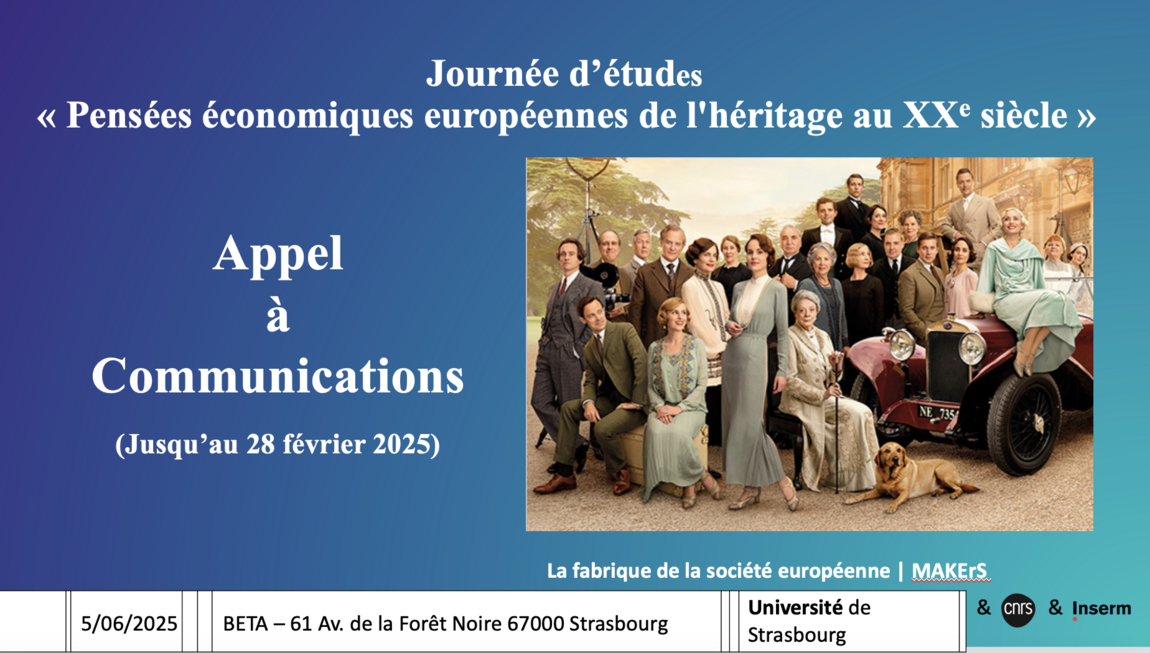European economic thought on inheritance in the 20th century

The 2025/06/05
From 9:30am to 5:30pm
Event details :
Co-organised by Philippe Gillig (BETA), Senior Lecturer at the University of Strasbourg, and Benoît WALRAEVENS (CREM), Senior Lecturer at the University of Caen-Normandie, in collaboration with Mélanie Plouviez (CRHI), Senior Lecturer at the University of Côte d’Azur, leader of the ANR PHILHERIT project (Philosophy of Inheritance),
The study day on ‘European economic thought on heritage in the 20th century’ will take place on Thursday 5 June 2025 in hybrid mode:
- face-to-face: at BETA – Room C205 (2nd floor)
- distance learning: on zoom
This study day will be the prelude to a conference in 2026 on the theme of heritage in the history of twentieth-century economic thought. This event is part of the MAKErS Chair in ‘Inherited economic thought in the twentieth century’, headed by Philippe Gillig.
Context
The idea of this workshop is to serve as a prelude to a conference in 2026 on the theme of inheritance in the history of twentieth-century economic thought.
The question of inheritance has been the subject of renewed interest in public debate for some years now, as during the last presidential election campaign in France, but also among economists and social science researchers, particularly since the work of Piketty, who highlighted the ‘return of inheritance’ (Piketty 2013), and that of Beckert, who highlighted the political risks of the concentration of wealth in a democratic society (Beckert 2008).
In their wake, there is an abundance of work today: on the link between inheritance and inequality, the work of Adermon et al (2018) in the case of Sweden, or that of Boserup et al (2016) in the case of Denmark, show that inheritance explains the correlation observed between generation and wealth levels. In France, we can cite the work of Frémeaux (2018) or the recent report by the French Conseil d’Analyse Economique (Dherbécourt et al. 2021). The OECD has also taken up the issue (OECD 2021). Moreover, these debates have recently given rise to normative proposals (Blanchard and Tirole 2021; Masson 2023) whose originality in terms of the history of ideas remains to be assessed.
However, in the history of economic thought, this question has long been ignored. And it has to be said that, despite the impetus given in recent years by the works of Erreygers and his co-authors (Erreygers and Vandevelde 1997; Erreygers and Di Bartolomeo 2007; Erreygers and Cunliffe 2013), there is no real enthusiasm for this subject. Only a few articles have since been published in the major international journals on the history of economic thought (Steiner 2008; Silvant 2015). Moreover, these works on the history of economic thought are all confined to the study of the 18th, 19th and very early 20th centuries.
The aim of this one-day workshop is therefore to make up for the glaring lack of studies in the history of economic thought on inheritance in the 20th century by focusing on the European case. What positions did European economists (and social scientists in general) take on inheritance in the 20th century? Did they debate among themselves and with their non-European colleagues? Did they make some proposals for reforming the taxation of inheritance, and if so, what kind of reforms? What influence have they had on European public policy on the issue of inheritance? Do liberal economists reproduce the paradox of their 19th century predecessors, namely the simultaneous defence of individual success and family inheritance? Or, with the advent of the notion of meritocracy in the 20th century (Young 1958; Gotman 2006), have inheritance and merit become antithetical in their thinking? How did so-called ‘neoliberal’ thinkers and economists view inheritance? The aim of this workshop is to provide some answers to these questions and to examine the evolution of law and public policies, as well as the influence, if any, of economists’ writings on these developments.
This conference is resolutely multidisciplinary. Proposals from economists, historians, sociologists, political scientists, lawyers and philosophers are welcome.
You can find the detailed programme and all the information you need on the ITI MAKErS website.






